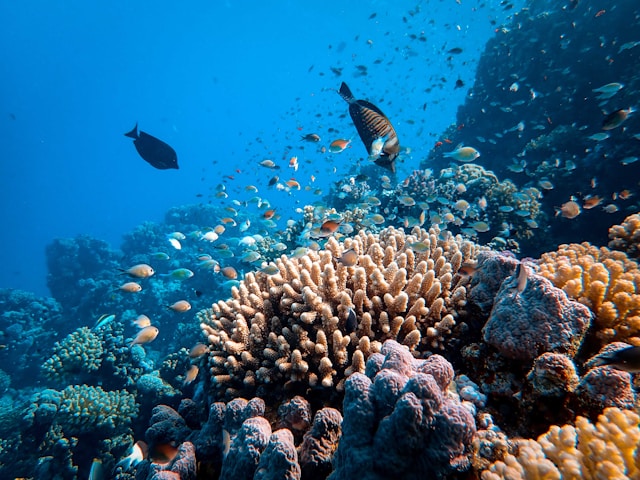- Australia’s Great Barrier Reef is experiencing its fifth mass bleaching event in eight years due to rising sea temperatures.
- Urgent action is needed to save the reef, as climate change poses the biggest threat to coral reefs worldwide.
- Despite government efforts, including increased funding for conservation, the reef’s future remains uncertain, with UNESCO warning of its serious threat from warming seas and pollution.
Australia’s famous Great Barrier Reef is facing another serious problem – mass bleaching. This happens when corals get stressed from heat and expel the algae that keep them alive and colorful.
This is the fifth time in eight years that this widespread damage has been seen at the UNESCO World Heritage site.
Before 2016, there were only two instances of mass bleaching. But now, it’s happening more frequently. Experts say urgent action is needed to save the reef.
David Ritter from Greenpeace Australia said they’re worried because these bleaching events keep happening every summer. He also mentioned that despite claims that Australia cares about the reef’s health, they’re still supporting industries like coal and gas, which contribute to climate change.
Simon Bradshaw from the Climate Council added that the situation is dire. He said the reef is literally being cooked because of the rising temperatures caused by climate change.
The Great Barrier Reef is huge, stretching over 2,300km off the northeast coast of Australia. It’s not just a coral system; it’s a home to many different kinds of marine life.
A recent aerial survey of 320 reefs showed that most of them are experiencing bleaching due to higher sea temperatures.
The Great Barrier Reef Marine Park Authority is now examining the extent of the damage. Roger Beeden, the Chief Scientist, said that the bleaching in the southern part of the reef is the worst it’s been in almost 20 years. He mentioned that if conditions improve, some of the bleached corals might recover.
Despite facing bleaching events, cyclones, and outbreaks of crown-of-thorns starfish, the reef has managed to recover in the past decade. However, the recent bleaching events are a cause for concern.
Not only is the Great Barrier Reef affected, but bleaching has also been observed in other parts of the world, including the southern-most reef at Lord Howe Island, which is also in Australian waters.
The Great Barrier Reef has been recognized as a UNESCO World Heritage site for over 40 years because of its importance. But UNESCO warns that it’s under serious threat from warming seas and pollution.
The Australian government has been trying to prevent UNESCO from declaring the reef “in danger,” which could lead to it losing its heritage status. The decision will be reviewed again in July.
Environment Minister Tanya Plibersek acknowledged that climate change is the biggest threat to coral reefs worldwide. She said her government has increased funding for reef conservation and set stronger targets for reducing emissions.
A recent UN report on climate change highlights that the frequency of future mass bleaching events depends on how quickly the world reduces emissions. So, it’s crucial for everyone to take action to protect places like the Great Barrier Reef for future generations.


